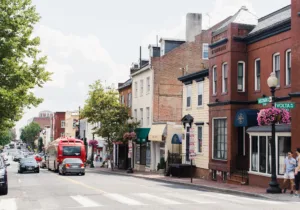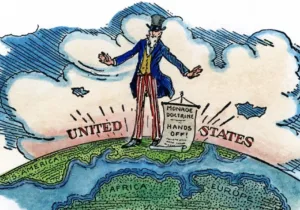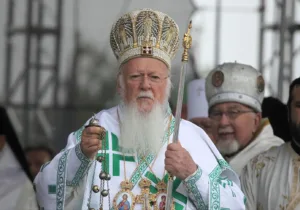By and large inaugural addresses tend to be dull affairs. Few remember their general content and fewer can quote them from memory. Those inaugural addresses we do remember tend to rally the American people around a vision for the nation carefully calibrated to resolve the crisis of the age – think of Lincoln’s dour ruminations on the origins of war or Franklin Roosevelt’s bold defiance in the face of economic hardship. Of the noteworthy inaugural address lines perhaps none is quite so famous as John F. Kennedy’s moving declaration: “Ask not what your country can do for you, but ask what you can do for your country.”
Like so many great speeches, Kennedy’s call to arms captured the sentiment of the day. In the age of volunteerism and George Bailey, he evoked the sense of gratitude and obligation so many Americans felt towards their common man. This nearly universal sense of duty is something that has largely been lost in an ocean of social media vanity and consumerism. If we want to restore some balance to our politics we must rediscover duty as soon as possible.
Recent scholarly accounts have blamed the liberalism of the American founding for creating the selfish society we live in. This argument is only partially true. Individualistic liberalism exists only in the most radical founders – the general spirit of the American Constitution, and liberalism itself, is much more complex. Most of the founders thought morality and piety were every bit as important as rights and institutions in encouraging human flourishing. John Dickinson’s first act as Governor of Pennsylvania was to issue a proclamation encouraging pious virtue and in the Constitution of Massachusetts, John Adams argued that without reverence for a higher being humans could not gain wisdom. In sum, most founders understand that to be successful a democracy requires a certain kind of culture.
Key to the culture the American founders envisioned was a sense of duty – the idea that we are bound by unchosen obligations and based upon prior commitments given to us by God. They thought that this principle supplied the foundation for all just human behavior. As John Quincy Adams put it: “In every situation in which mortal man can be placed there is a line of conduct before him which it is his duty to pursue.” The founders further understood that duty may often conflict with our own personal inclinations, but without sacrifice, there can be no reward in this life or the next. Far from being responsible for the erosion of our sense of obligation to one another, the freedom to pursue duty thus served as the whole foundation of the founders’ version of liberalism. The idea that we as individuals possess rights given by God gives both government and private citizens alike a tremendous feeling of obligation.
Having said all of this, it must be admitted that the founders of the United States did not do enough to preserve the continued cultivation of a sense of duty among the American people. A strong sense of duty was so ubiquitous in the late eighteenth century that many saw little point in dwelling on how to perpetuate such a pervasive cultural norm. In short, neither John Adams nor Thomas Jefferson could conceive of an age like our own – an age where many spend their lives trying to avoid obligation as much as possible. As a result, the founding fathers simply took it for granted that religion and education would work to tirelessly sustain the dutiful culture they knew the country needed.
This begs the question, what inhibited the founders’ ability to foresee the gradual erosion of duty from the rule to the exception? What about democracy or the arrangement of the nation could have precipitated the decline of duty? Competing explanations to these questions have been offered over the years. Some blame the gradual discarding of a sense of moral obligation to our communities on the rise of the welfare state and others on the advent of social progressivism.
Both of these explanations may hold validity, but the most compelling explanation for our present problem is found in the writings of the French political theorist Alexis de Tocqueville. Though generally a defender of democracy, throughout his career Tocqueville warned of how democratic regimes can give birth to corrosive individualism. Democracy tells every man he can rule himself unaided and, as a consequence, citizens begin to turn away from the institutions that once guided them. Religion, tradition, and philosophy are all tossed aside in favor of individual supremacy. Democracy, to amend Huey Long’s famous catchphrase, tells every man he can be a king and needs no help ruling.
In previous ages, the old wellsprings of culture – tradition, religion, and philosophy – sustained themselves through the rigid hierarchy of aristocracy. The radically individual and egalitarian ethos endemic to democracy spelled certain death for the vital communal once held together, though imperfectly, by a powerful few with a sense of aristocratic duty. However, Tocqueville argues that the solution to the problem of democracy can be solved by the proper arrangement of a democratic society. The term “democracy” means “rule of the people.” Thus, at least in theory, democracy is a regime that requires human self-government in the broadest sense of the term; it requires that each and every one of us participate in the deliberative process of governing the community. This entails far more than simply showing up to vote; it also means engaging with our fellow citizens in shaping society.
It is important to note that such self-government cannot be a national affair. Instead, meaningful self-government only truly exists at the local level where individual citizens can take part in government simply by showing up and making their case. Likewise, the pre-democratic foundations of duty, our patrimony, are rooted institutions – they can only truly exist in the local communities where the people themselves are. As a result, Tocqueville argues, the new democratic age links the pre-modern concept of duty with the modern practice of self-government – one cannot exist without the other.
Thus, if we wish to truly revive a sense of duty, we must wage war against the encroaching influence of national and international ideological narratives. We must restore to our local communities the cultural and political distinctiveness they once held. In The Social Contract (1761) Rousseau declares that “mankind is born free, but everywhere he is in chains.” Since those words were written, numerous “sophisters, economists, and calculators” (Edmund Burke’s words for disdainers of duty) have worked tirelessly to shatter every such chain, every tie that binds. Several centuries later, they have largely been successful, and we are beginning to realize the disastrous results of this endeavor. Humans are awakening to the reality that not all chains are bad, that the strictures which tradition, religion, and duty place on us can be good things. Unchosen limits and obligations make us, ironically, freer and happier by enabling a truly democratic polity. The time is ripe for us to seize on this dawning sentiment and with it revive, once again, a sense of duty.






 Sponsor a student for Christianity & National Security 2024
Sponsor a student for Christianity & National Security 2024